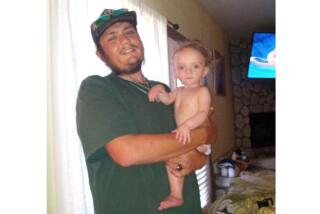When Punishment Becomes Child Abuse
- Share via
There is a common misconception about raising children. You may have heard it in the expression “spare the rod, spoil the child.” The belief is basically this: Criminals are created when parents fail to punish their children swiftly and strictly, and the solution to any problem is harsher punishment.
Tolerance and compassion are viewed as breeding grounds for bad behavior. Children must learn right from wrong by being hit hard for the latter, and the younger we start, the better. Thus drug addicts go to prison for years and 11-year-olds are tried as adults.
Having worked with severely emotionally disturbed children and their families for the past decade, I am painfully aware of a chasm between good behavioral research and popular beliefs. I know beyond a shadow of a doubt that criminals are raised, not born, and that what makes children into criminals--particularly the violent ones--is not leniency or tolerance but neglect and abuse.
Not a single empirical study contradicts this conclusion. It is love and understanding that delinquent children often lack, not an iron fist. Certainly, a total lack of structure in a child’s home is a common predecessor to petty crimes, truancy and drug abuse. The truly dangerous adolescent is almost always the product of a neglectful or abusive family--one in which the adults ignore the child’s needs or the child is subject to physical and emotional harm.
I am not talking about the occasional spanking. Appropriate physical discipline, while in no way necessary, does not appear to traumatize children. But physical punishment that endangers a child’s health, requires medical attention or causes a child to be terrified of his or her parents is abuse, and it harms, not helps, a child’s growth.
Abuse is usually a product of parental anger and frustration, not a desire to teach youngsters right from wrong. With this in mind, it was with outrage and great sadness that I learned of a recent decision by Orange County Superior Court Judge James Perez. Perez presided over the trial and sentencing of Wellington Soto, an Anaheim father who admitted burning his son’s hand on a gas stove after the boy stole from a store.
Perez, in a ruling that is utterly opposed to the truths of child development and insulting to true proponents of multiculturalism, fined Soto $100 and allowed the boy to remain in his parents’ custody, citing “customs and habits” and stating that “hopefully, the child has learned a lesson.” Perez reminded the courtroom that all the kids in Juvenile Hall “started with little things.”
Soto’s son is 5 years old; he stole a pack of gum. Perez has no business ever hearing a child abuse case again unless he educates himself about matters of child development. The only lessons this boy has learned are that his father is dangerous and unforgiving and that the U.S. justice system is more concerned with protecting the property of candy-store owners than with keeping children safe.
More to Read
Sign up for Essential California
The most important California stories and recommendations in your inbox every morning.
You may occasionally receive promotional content from the Los Angeles Times.










